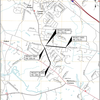GCSD tackles teen drug abuse
The Enterprise — Melissa Hale-Spencer
Speaking out: “It was really a life-changing event,” says Bella Nezaj, right, of a Farnsworth Middle School field trip to Ed Frank’s Beacon of Hope, where the eighth-graders heard stories of drug addiction. Her classmates, Christopher Ludopoulos, left, and Ally Jurczynski, center, agreed.
GUILDERLAND — “We can’t put our heads in the sand on this issue,” said Superintendent Marie Wiles about teenage drug use and addiction.
She praised a Nov. 12 session at the high school sponsored by the Addictions Care Center of Albany, focusing on the dangers associated with drug abuse of opiate medications as a gateway to heroin addiction. A follow-up session will be held on Feb. 25.
Wiles’s words were echoed by Regan Johnson, the district’s supervisor for athletics and health, who, in addition to the ostrich comment, stated, “We can’t say this isn’t a problem in our town.”
Tuesday’s school board meeting had opened with unsolicited testimonials by three eighth-graders from Farnsworth Middle School who said a recent field trip — to Ed Frank’s Beacon of Hope on the outskirts of Altamont — had changed their lives.
After his son, a police officer and racecar driver, died of cancer, Frank took up his cause and used his racecar number, 301, to create the Choices 301 program, meant to teach kids about the dangers of driving drunk and using drugs. Frank invites victims of drunk-driving crashes as well as those convicted of the crime to tell their stories.
Martin Curro, a middle school health teacher, said that Guilderland is the only district that takes middle-school students to Frank’s program.
Fourteen-year-old Bella Nezaj said of Frank, “His son died of cancer; that wasn’t his son’s choice.” But, she went on, others have made the wrong choice.
Nezaj told of the “incredible stories” she and her classmates heard from people in a rehab program; with 20 people in the room, she said, “You could hear a pin drop.”
Some people had started using drugs at her age, she said, concluding of the session, “It was really a life-changing event.”
Ally Jurczynski, 13, said it was not a typical field trip. Rather, she said of the Beacon of Hope, “It was the most interesting place I’ve ever been to.”
Jurczynski said she learned “how bad and addictive drugs are” and that addiction is a disease. She described the session as “really inspiring.”
“It was one of the most amazing trips,” agreed Christopher Ludopoulos, also 13. “It certainly gave us the fear of drugs.”
He concluded, “I will always think about this field trip when I’m in a bad situation…I will stay away from drinking and driving.”
“So often at 11, 12, 13, the drug use begins,” said board President Barbara Fraterrigo. “It just goes downhill from there.”
Curro described the bus ride from school to Ed Frank’s center as “high volume” with kids who were excited. “On the trip home,” he said, “not so much.” Instead, Curro said, “There was a lot of reflection.” One boy, he said, “broke down.”
“We want to be the first stop”
Ann-Marie McManus, an assistant principal at the high school, described the Nov. 12 program, which attracted a standing-room-only crowd. She said she was “very moved” by the people who told their stories.
The current trend, she said, is that the “typical drug addict” is decreasing in age and that abuse of prescription opiates can lead to heroin addiction. There’s a perception, McManus said, that, “It’s not illegal because it’s prescribed.”
She also said, “The brain doesn’t fully develop until age 25.
“We do a lot,” McManus said of the school district’s role in preventing drug abuse.
She listed teaching about drugs in health classes, working on prevention with local police, conducting searches at school with trained police dogs, hosting informational nights for parents, sponsoring anti-bullying programs to empower children so they are able to make the right choices, supporting clubs like Students Against Destructive Decisions, and working with counselors to identify students with problems.
“We want to be the first stop…the prevention and intervention,” said McManus.
She also said the district helps support families who have children with addictions by recommending doctors and facilities, and by working through health-insurance issues.
Johnson called the Nov. 12 program “a home run.” He said a lot of middle-school students went with their parents and he has heard that “opened the door for conversations…that need to be done.”
Curro said that a child going into his parents’ medicine cabinet to take prescription opiates will have “a heroin-like experience,” and, because the child’s weight is so much less than the weight of the adult the medicine was prescribed for, the experience will be more intense.
Prescription narcotics, he said, are a gateway drug.
Lori Rafferty, also a middle school health teacher, said the most important message to get across to parents is, “No one is immune to this. This isn’t bad, troubled kids.”
She said some of those addicted to drugs are school athletes or in honor society or drama club. “It’s not just the traditional ‘bad kid,’” she said. “Every single parent has to talk with their kids.”
She also advised not to flush unwanted prescription medications as it could affect water supplies. Instead, she said, they can be brought to any State Trooper barracks, “no questions asked.”
Fraterrigo agreed that it isn’t just bad kids using drugs. She described “one young lady” who had been to rehab after rehab, had lived on the streets and been to jail as her parents begged her to stop, but had once been a straight-A student, a star athlete, and a cheerleader.
“We’ve had seven deaths in this town for heroin overdoses in the last few years,” Fraterrigo concluded.


